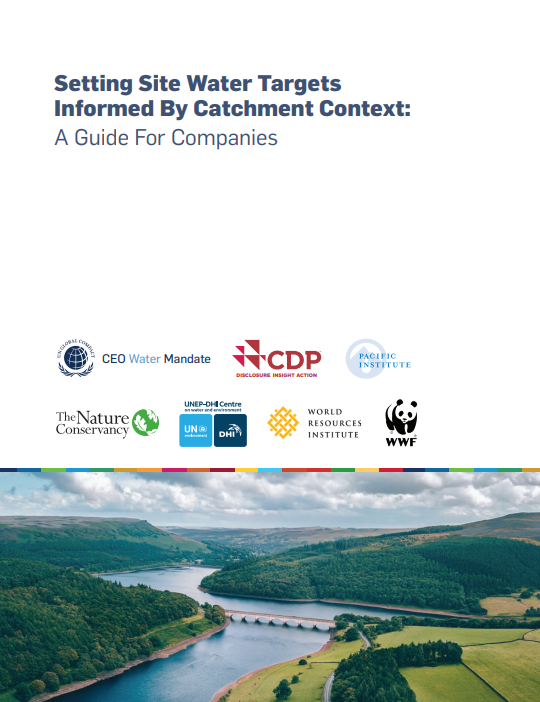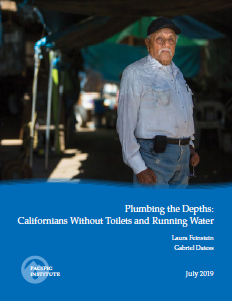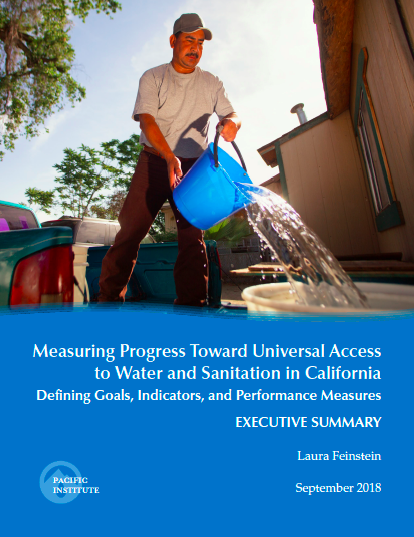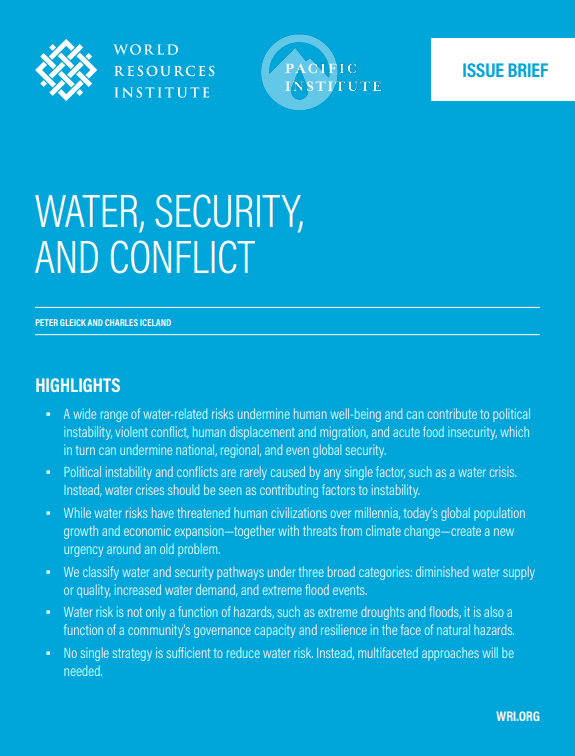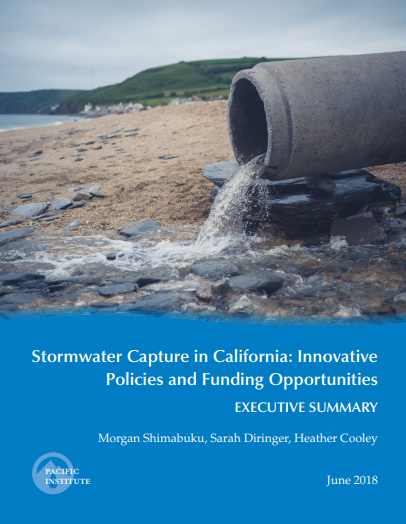1071 Resources

National Geographic ScienceBlog: The Impacts of California’s Drought on Hydroelectricity Production
March 17, 2015 | post
California’s hottest and driest drought in recorded history has shifted the sources of electricity with adverse economic and environmental consequences. The Pacific Institute has just completed and released a report that evaluates how diminished river flows have resulted in less hydroelectricity, more expensive electricity from the combustion of natural gas, and increased production of greenhouse gas emissions.
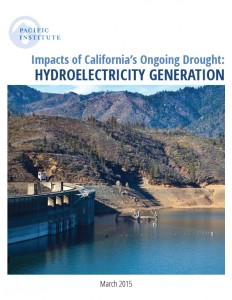
Impacts of California’s Ongoing Drought: Hydroelectricity Generation
March 17, 2015 | publication
California’s hottest and driest drought in recorded history, from 2012 to 2016, shifted the sources of energy for electricity with adverse economic and environmental consequences. This report focuses on the period of drought from 2011 to 2014.
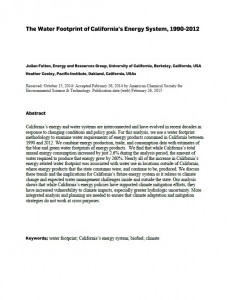
The Water Footprint of California’s Energy System, 1990–2012
March 11, 2015 | publication
A new article by Julian Fulton and Heather Cooley evaluates the amount of water consumed in meeting California’s energy needs – also referred to as the water footprint of energy.


National Geographic ScienceBlog: Tackling Global Sustainability: A Need for Integrated Systems Approaches
February 27, 2015 | post
If there is anything that the past few decades of research and study of major global challenges tells us, it is that truly effective solutions to sustainability challenges require truly integrated approaches across disciplines, fields of study, data sets, and institutions. We are not going to solve 21st century global problems with 20th century tools.

Knowing and Showing that Companies are Respecting the Human Rights to Water and Sanitation
February 18, 2015 | post


Guidance for Companies on Respecting the Human Rights to Water and Sanitation
January 16, 2015 | publication
In 2007, the United Nations Global Compact (UNGC) was created as a strategic policy initiative for businesses committed to aligning their operations and strategies with 10 principles related to human rights, labor, environment, and anti-corruption.
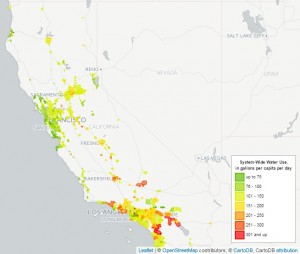
California Urban Water Suppliers Water Use Map
January 14, 2015 | publication
This web app from the Pacific Institute shows how different California cities are responding to the ongoing drought. This web feature brings to life newly-released data on residential and system-wide water use, and allows users to explore trends and patterns in that use.

National Geographic ScienceBlogs: The State of the California Drought: Still Very Bad
January 14, 2015 | post
While we do not know yet what the rest of the wet season will bring – and while we hope for the major storms needed to recharge our rivers, groundwater and reservoirs – it seems increasingly likely that California will not see enough precipitation to get out of the very deep deficit that three years of drought (so far) have produced.
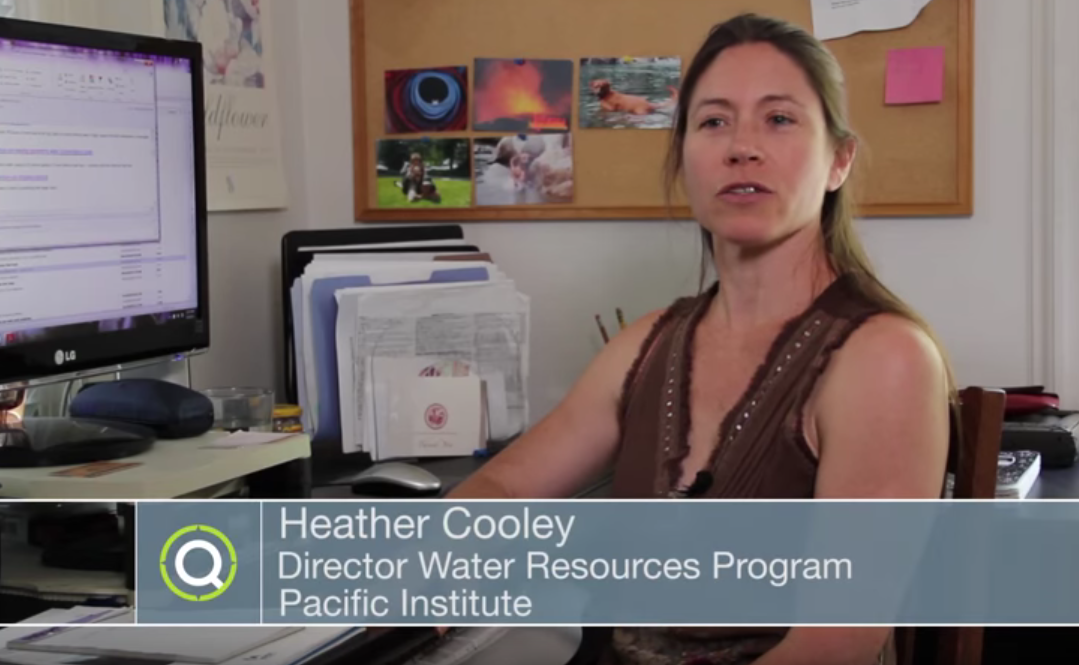

National Geographic ScienceBlogs: The Growing Influence of Climate Change on the California Drought
December 8, 2014 | post
Over the past three years (and indeed, for 10 of the past 14 years) California has experienced a particularly deep drought. How bad is the drought? Is it the worst in the instrumental record? The worst in over a century? The worst in 1200 years? The worst “ever”? And why has it been so bad?

New Data Show Residential Per Capita Water Use across California
November 18, 2014 | post
New monthly water use data for California water utilities shows that residential water use varies widely around the state, and that the response to the drought has been uneven.

The New York Times Food for Tomorrow Conference on Sustaining the Global Food Economy
November 13, 2014 | video

National Geographic ScienceBlogs: Peak Water: United States Water Use Drops to Lowest Level in 40 Years
November 5, 2014 | post
The most important trend in the use of water is the slowly unfolding story of peak water in the United States and elsewhere.

Huffington Post: The California Water Bond is a Beginning, Not an End: Here’s What’s Next
November 5, 2014 | post
California voters have approved Proposition 1 - the 2014 California Water Bond. The ultimate value and effectiveness of the bond will depend on how it is implemented and how the funds are spent.

Huffington Post: What Does Proposition 1 — the 2014 California Water Bond — Really Say?
October 23, 2014 | post
On November 4, California voters will decide the fate of Proposition 1 -- the 2014 Water Bond -- which authorizes the sale of $7.12 billion in new general obligation bonds and the reallocation of an additional $425 million of previously authorized, but unissued, bonds.
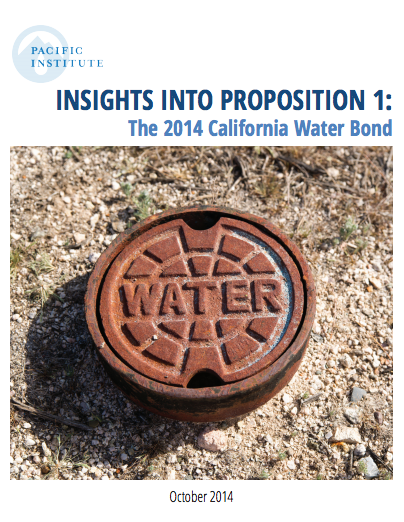
Insights into Proposition 1: The 2014 California Water Bond
October 23, 2014 | publication
This report provides a comprehensive analysis of Proposition 1, the Water Quality, Supply and Infrastructure Improvement Act of 2014, which was approved by California voters in November 2014.


Huffington Post: When Our Responses to Drought Make Things Worse
October 20, 2014 | post
In a new study just published by the journal Sustainability Science (Springer), analysis from the Pacific Institute shows that many of the fundamental responses of California water...

National Geographic ScienceBlogs: An Open Memo on Ebola and Water
October 16, 2014 | post
As input to the ongoing discussions about how to meet and overcome the spreading risks of Ebola, here are some summary thoughts about the water-related components of U.S. efforts.

The Corporate Water Disclosure Guidelines – A common and meaningful way for companies to track and communicate their water performance, risks, and impacts
October 7, 2014 | post
This week, the CEO Water Mandate launched its finalized Corporate Water Disclosure Guidelines – a common approach for companies to effectively and intelligibly disclose the many elements of their corporate water management practice to key stakeholders.

National Geographic ScienceBlogs: The Death of the Aral Sea
October 6, 2014 | post
In the 20th century, society was either ignorant of, or ignored, the consequences of bad water management. The goal was economic development at all costs.
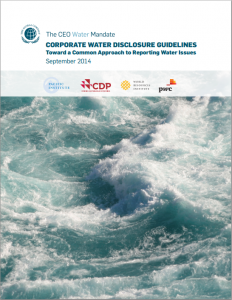
Corporate Water Disclosure Guidelines: Towards a Common Approach to Report Water Issues
September 29, 2014 | publication
The UN Global Compact’s CEO Water Mandate initiative has released the finalized Corporate Water Disclosure Guidelines – a common approach for companies to effectively and intelligibly disclose the many elements of their corporate water management practice to key stakeholders. The Guidelines are available as a PDF report and web-based tool.
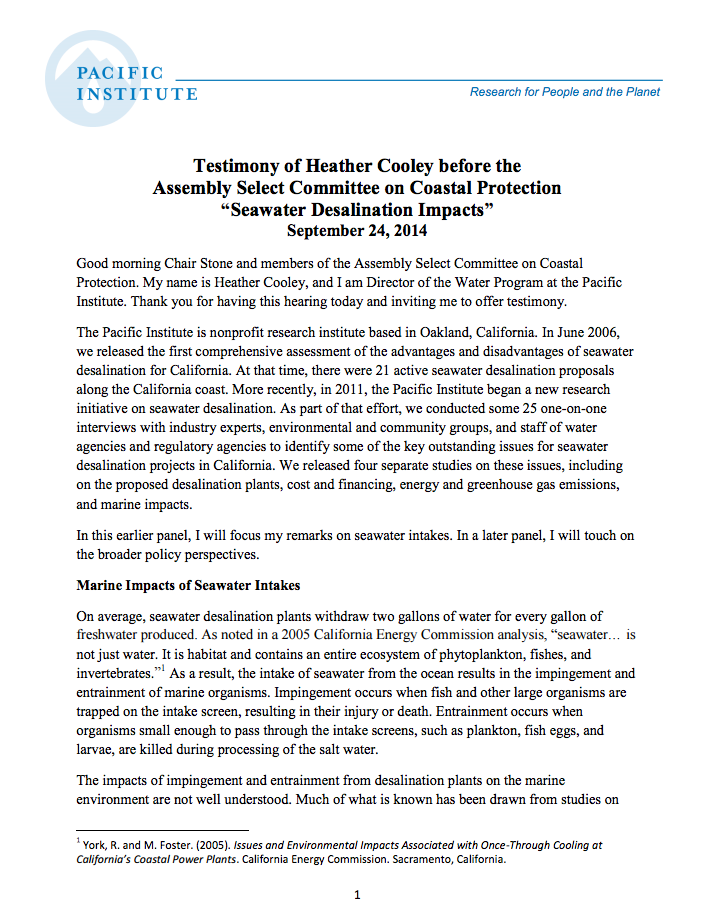
Testimony: Desalination Impacts before the Assembly Select Committee on Coastal Protection
September 25, 2014 | publication
On September 25, 2014, Pacific Institute Water Program Director Heather Cooley testified before the Assembly Select Committee on Coastal Protection. Heather spoke separately on desalination intakes and broader policy issues of desalination facilities.
Page 25 of 43



